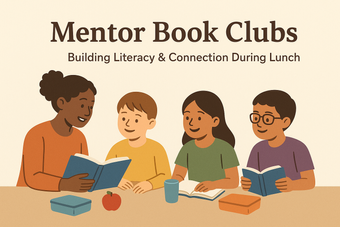Mentor Book Clubs: Building Literacy and Connection During Lunch
👥PROPOSERS: Amy Dunn, Amy Thornton, LeAnna Mosley, Kara Womble ⭐IMPACT: Students at MMS participating in the book club
Impact: Students at MMS participating in the book club
Grant Proposal Idea: Mentor Lunchtime Book Clubs to Increase Literacy in Middle School
Need Statement: Literacy rates among middle school students continue to reflect gaps in reading stamina, comprehension, and engagement. Many students, particularly those from underserved backgrounds, report limited access to positive adult reading role models outside of the classroom. At the same time, social pressures and busy after-school schedules often reduce opportunities for students to engage in authentic, low-stakes reading experiences. By integrating structured book clubs during lunchtime, facilitated by community and staff mentors, the district can increase literacy engagement while also fostering meaningful relationships between students and caring adults.
Program Description: The Mentor Lunchtime Book Clubs initiative will create small, voluntary book club groups for students in grades 6–8, meeting twice a month during lunch periods. Each group will be paired with a teacher, librarian, administrator, or community mentor who models reading fluency and facilitates discussion.
Format: Students bring their lunch to a designated space (library, classroom, or commons area). Clubs will read high-interest, grade-appropriate novels or nonfiction texts, selected with student input, that connect to diverse perspectives and student interests.
Mentorship Component: Mentors will guide discussion, model comprehension strategies, and foster a positive reading culture.
Student Choice: Students help select the books, encouraging ownership and motivation.
Equity of Access: All books will be provided free of charge to participating students.
Goals and Objectives:
- Increase Literacy Engagement – By the end of the school year, at least 75% of participants will report improved enjoyment of reading on student surveys.
- Improve Comprehension Skills – Participating students will show measurable growth on district reading benchmarks (target: 10% average increase).
- Strengthen Mentor-Student Relationships – 80% of students will report feeling more connected to at least one adult mentor at school.
- Promote Inclusive Literature – Book selections will include diverse authors and perspectives to broaden student worldviews and empathy.
Activities & Implementation Timeline:
- Fall: Recruit mentors, purchase books, market program to students.
- October–May: Clubs meet twice a month during lunch. Each book club completes 3–4 books per year.
- Spring: Showcase event (e.g., “Literary Lunch Celebration”) where students share reflections, artwork, or projects inspired by their readings.
Resources Needed: Books (class sets for each club) Mentor training/orientation materials Incentives (bookmarks, journals, recognition certificates) Refreshments for showcase event
Evaluation: Pre- and post-program student surveys measuring attitudes toward reading. Tracking student participation and attendance. Comparison of literacy assessment data before and after program. Mentor feedback surveys to refine implementation.
Budget Estimate (Sample):
- Books for clubs (approx. $10 per book × 100 students × 3 books) = $3,000
- Mentor training & materials = $500
- Program supplies/incentives = $500
- Showcase event = $1,000
- Total Requested: $5,000
Sustainability Plan: Following the grant year, the district will continue the program by reusing purchased book sets, integrating mentorship into advisory periods, and seeking additional community partnerships with local businesses and libraries.

